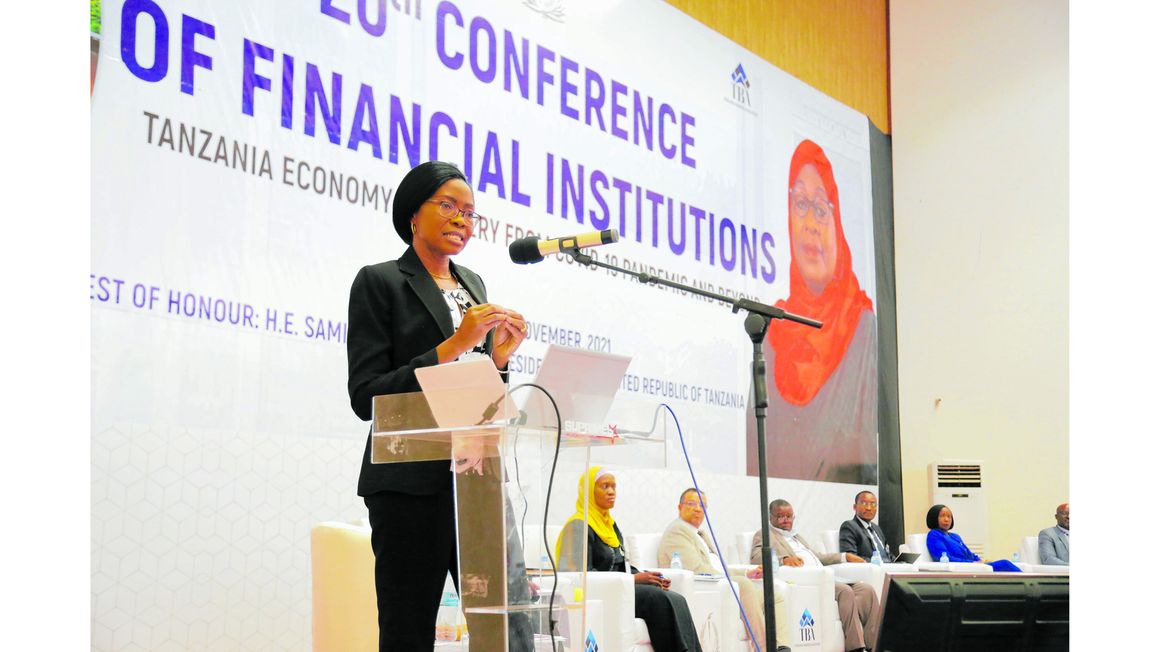NMB Bank Plc chief executive Ruth Zaipuna makes a presentation at the 20th Conference of Financial Institutions (Cofi) in Dodoma. PHOTO | CORRESPONDENT
Dodoma. Lenders are pledging to raise the amount they lend to the productive sector as they seek to play an increasingly important role in the post Covid-19 economic growth endeavours.
Speaking during the just-ended 20th Conference of Financial Institutions (Cofi), bankers exhibited a bullish outlook of the flow of lending to the private sector, banking their hopes on a recovering global economy and efforts by the Bank of Tanzania (BoT) to boost credit intermediation.
“To spur credit growth to the private sector post-Covid-19, a number of actions have to be taken by all key stakeholders. These actions require a collaborative approach in order to ensure sustainable impact on the economy,” said NMB Bank Plc chief executive Ruth Zaipuna in a presentation titled Scaling up Private Sector Credit Beyond Covid-19 Pandemic: Role of Government, Financial Institutions and Private Sector.
Already, official figures point to the fact that there has been an improvement in banks credit to the private sector during the past few months, thanks to BoT measures and the recovery of global economic activities.
For instance, private sector credit grew 4.6 percent in September, from 3.2 percent in August, BoT figures show.
According to Ms Zaipuna, the conditions were precisely in support of increased private sector lending and bring the economy back to a sound growth momentum after last year’s Covid-19 bruises.
She said timely national policy responses to cushion the economy from being devastated by the effects of Covid-19 also ensured that the local banking sector remained resilient during the hard times.
In 2020, the global economy slowed down by 3.1 percent but the IMF now expects world output to grow by 5.9 percent in 2021.
In Tanzania, the BoT Governor, Prof Florens Luoga, told the 20th Cofi participants that the national economy will grow by 5.2 percent in 2022.
This would be a rise from a growth of five percent in 2021 - and from 4.8 percent in 2020.
With supportive policy measures, Ms Zaipuna said the banking sector has been doing well, with asset size rising by 4.16 percent in 2020 - to Sh34.68 trillion - while deposits rose by nearly four percent, to Sh24.77 trillion.
Similarly, the banking sector’s capital adequacy ratio remained high, signifying the banks sustained ability to meet maturing obligations.
Most banks also continued to make profits, with NMB Bank posting the historic income of Sh206 billion in 2020.
“With the sector’s stability and resilience, banks continued to provide services in the pandemic period, while ensuring the health and safety of staff and customers,” Ms Zaipuna said.
The banks promoted increased use of alternative payment channels, and widened access to digital services by increasing transaction limits and foregoing certain fees. Consequently, the number and value of electronic transactions went up to Sh126 trillion in 2020, up from Sh99 trillion in 2019.
“The growth was partly on account of the BoT’s policy measures to encourage use of digital financial services, including increasing mobile money transactions and balance limits,” Ms Zaipuna said.
Other policy measures adopted in 2020 to remedy or cushion the economic impacts of Covid-19 were the reduction of cuts on government securities and cutting the statutory minimum requirement (SMR) to six percent.
BoT also reduced the discount rate to five percent to cut borrowing costs for commercial banks - and, thus, improve their liquidity.
It also allowed the banks to discuss restructuring of loans with borrowers hit hard by the pandemic.
In order to provide great impetus to fast increase credit to the private sector and lower interest rates, thereby hastening recovery of the economy, BoT implemented other measures in July 2021.






No comments :
Post a Comment